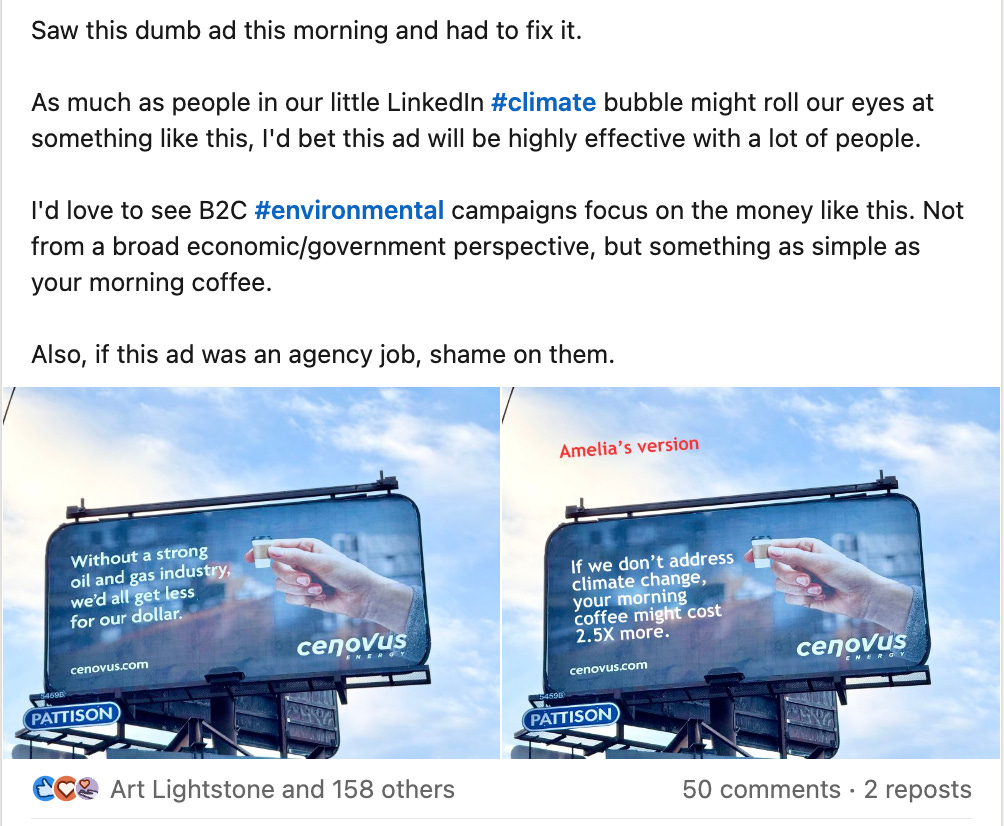TCC #61 — Follow the money
Climate communicators are ignoring economic messaging, and it's costing them.
Hello climate communicators,
A few months ago, I wrote a LinkedIn post that seemed to strike a chord.
I’d seen this billboard on the way to the gym that morning and it made me so angry I had my partner pull over so I could take a photo. Thankfully, he’s used to this behaviour — he’ll even point out environmental messaging (i.e. greenwashing) when we’re out and about, just so I can get a photo.
Anyway, I’m bringing it up again here not to make you mad at the fossil fuel companies, even though they deserve it. I’m bringing it up because I think this campaign represents a kind of gold standard in compelling communications.
And unfortunately, it’s for the other side.
Let’s break down this billboard quickly. It presents a persuasive argument: we already know what inflation feels like. We know what it feels like for the same monthly wage to buy far less at the grocery store. And we certainly don’t want to feel even more of this. That little shrunken coffee cup is a pretty great image of what it feels like to be hit hard by these economic forces.
Notice, too, that they don’t even need to use the word ‘inflation’ — they just use the simpler, plainer version: “less for our dollar.”
Beautiful, really. I wish I’d written it.
At the same time, the ad doesn’t directly mention climate change, renewable energy, or any other such hoax. It just talks about a “strong oil and gas industry,” which is a particularly reassuring concept to many people reading this sign. In a country like Canada, where I snapped this photo, most people would be hard-pressed to mention major national industries or sources of income outside of our oil and gas industry. We may be a small country, but we do have oil.
So when your average Canadian hears messages like the Left wants to take away your oil and gas, it translates to one thing: less money for me. Harder life for me. When life is hard already, we don’t have the capacity to think bigger — about the atmosphere, about future generations, about poor countries ravaged by tornadoes and floods. Hardship drives people to survival, which looks, on the outside, like selfishness. But ultimately, in hard times, looking out for #1 (and maybe #1’s children) is what we’re wired for.
If we keep trying to persuade people to buy sustainable products or vote for climate-focused candidates for the greater good, or because it’s the right thing to do, we’ll risk being labelled as privileged, over-educated elites who are out of touch with reality. Ah, wait — I think we already have been.
So we need to start framing climate action in economic terms. Until we can clearly and compellingly communicate that sustainable products, services, and initiatives are the best option for financial and other directly-felt reasons, we will be forever pushing this boulder up a hill.
In the billboard example above, I’m pretty sure my anger that morning led me to focus on the negative economic outcomes of unchecked climate change (namely, that almost everything will be more expensive). If I could revisit it with a clearer head, I’d rewrite this along the lines of the economic benefits that clean energy, for example, would bring to the country.
I have a feeling Meg and I are going to touch on this in a future piece, but we really do need to start moving sustainability comms away from sustainability and towards the other tangible benefits that sustainable solutions almost always provide.
Electric cars don’t just have no tailpipes. They’re also quieter, cheaper to refuel, and more fun to drive (if you’re into acceleration).
Heat pumps aren’t just atmosphere-friendly. They’re also quieter, more efficient, and better at regulating temperatures.
Solar isn’t just cleaner. It’s also cheaper, more resilient, and reduces dependence on foreign energy.
The list goes on.
Sustainable options need to bring more than just a cleaner planet in the future, and the good news is, so many of them do. The bad news is that most people don’t know about these other benefits, because we’ve spent so long talking about the planet and not about people.
We know what consumers and the voting public care about, and it’s not greenhouse gas emissions, or a 1.5°C bump in temperatures, or the fact that sea levels rose 0.6 cm last year.
So let’s make sure that, whatever we’re selling, we’re talking about what people care about — what will actually make them move the needle and tap their cards — and not what makes their eyes glaze over or makes them shout “it’s a hoax!”
That’s it from me today — stay sane, everyone.





This feels like THE most important thing to think about with sustainability comms. You've laid this out so powerfully – I love that you brought up the only thing that matters when things get tough is ourselves & our children. It's so true & worth remembering when we look at product messaging. Thank you, and wonderfully said 👏
Thanks for talking about this! I recently started working with Oxfam where they've merged the climate & the economic inequality campaigns because they were so interconnected - but also because we feel the economic impact more acutely and that messaging connects with us more directly than climate disaster warnings.